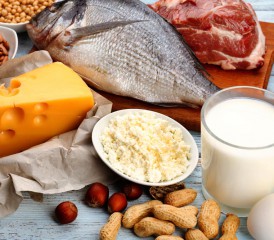Foods That Prevent Cancer-Related Weight Loss
Health & WellnessWritten by Tejal Parekh | Edited By Walter Pacheco

Losing the desire to eat is extremely common and can be caused by a number of changes, including the stress of a cancer diagnosis, treatment, side effects or pain.
If we go too long without eating enough, we lose weight.
Weight loss from not eating enough means that you lose a combination of muscle and fat.
While many feel this is not necessarily a bad thing, excess weight loss can lead to:
- Delayed healing after surgery
- Longer recovery time between chemotherapy cycles
- Possible delayed radiation therapy due to debilitating side effects
Dehydration and fatigue also are common side effects from eating poorly, and all these factors can severely impact quality of life.
In order to prevent unwanted weight loss, we need to ensure we are getting enough calories and protein.
Proteins are the building blocks of our cells. They are responsible for the body’s growth and repair. Getting a mix of calories from protein, fat and carbohydrates will help keep you mentally and physically strong.
Tips That Help You Maintain Weight
Small meals
Eat 5-6 small meals or snacks every 2 or 3 hours, instead of 3 large meals a day.
This will be easier to accomplish than eating too much at one time and will ensure you consume all the daily calories you need.
Nutrient dense foods
Eat nutrient dense foods that pack plenty of calories and protein in a small amount.
These foods include full-fat Greek yogurt, cheese, eggs, salmon and homemade milkshakes using whole milk, fruit and a scoop of protein powder.
Supplements
Nutrition supplements or meal replacement drinks such as Boost or Ensure can be useful when you are having difficulty eating or swallowing.
Check with your dietitian or physician to find the products right for you.
Avoid smelly kitchens
If smells from cooked food bother you and make you lose your appetite, try to eat colder foods, such as sandwiches or cheese with crackers.
These foods tend to be less smelly.
Also, avoid the kitchen when food is cooking. Instead, sit outside and breathe in fresh air.

Free online support group helps patients and families cope with the emotional effects of mesothelioma.
Sign Up NowTaste preferences change
Changes in palate are common, especially after chemotherapy.
Experiment with different flavors such as sweet, sour, salty and bitter to better identify what your taste buds can handle.
Many people find sucking on lemon drops or mints can help.
Homemade mouthwash
A homemade mouth rinse composed of 1 quart water, ¾ teaspoon of salt and 1 teaspoon of baking soda can help clear your taste buds before a meal and can also help with dry mouth.
Setting timers as eating reminders
Forgetting to eat at least every 3 hours? Try setting a timer or reminder on your watch or smartphone to help you keep track.
If you are busy with work, doctor appointments or simply not feeling great, it is easier than you think to go half a day without eating or drinking.
Don’t just drink water
Drinking water is great, but milk, 100 percent fruit or vegetable juices and soups will hydrate and provide some extra nutrition, too.
Foods to Keep You Nourished
High Protein Foods
Protein repairs body tissue and keeps our immune systems healthy. These foods will ensure there’s enough protein in your diet so you can recover faster and boost your resistance to infection.
- Dairy products, including milk, cheese, yogurt (especially Greek) and cottage cheese
- Meat, poultry and fish
- Nuts and peanut butter (good on bread, crackers and milk shake)
- Eggs
- Beans, seeds and other legumes
- Meal replacement shakes
- Protein powders
High Calorie Foods
Fats and oils serve as rich sources of energy for the body. In addition, they also insulate body tissues and transport some vitamins through the blood.
- Ice cream, whole milk, heavy cream, sour cream, creamy salad dressings
- Nuts in cereals
- Peanut butter and jelly sandwich
- Whole eggs cooked in olive oil or butter
- Fats and oils, including olive oil, canola oil, butter, margarine
- Meal replacement shakes
Fluids
The body needs water and other fluids to survive. Water keeps you hydrated and your body cells need it to function, but also remember that soups, milk and others count toward fulfilling your fluid goals.
- Seltzer water or sparking waters
- Soups or broths
- Gelatin
- Popsicles and fruit ices
- Iced or hot fruit teas
- Meal replacement shakes
- Sports drinks
Before undergoing any changes in diet, remember to talk to your doctor or dietitian, especially if you are unsure about how much weight you have lost or what to do about your loss of appetite.




